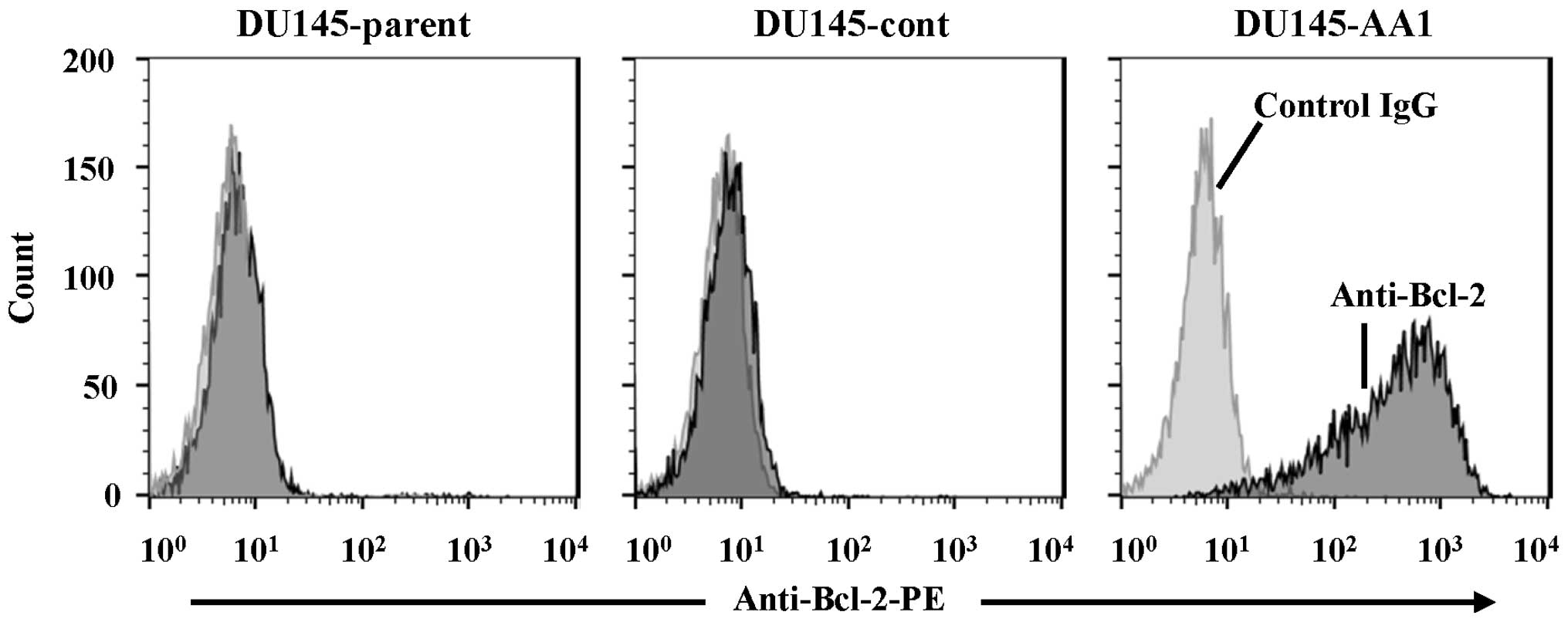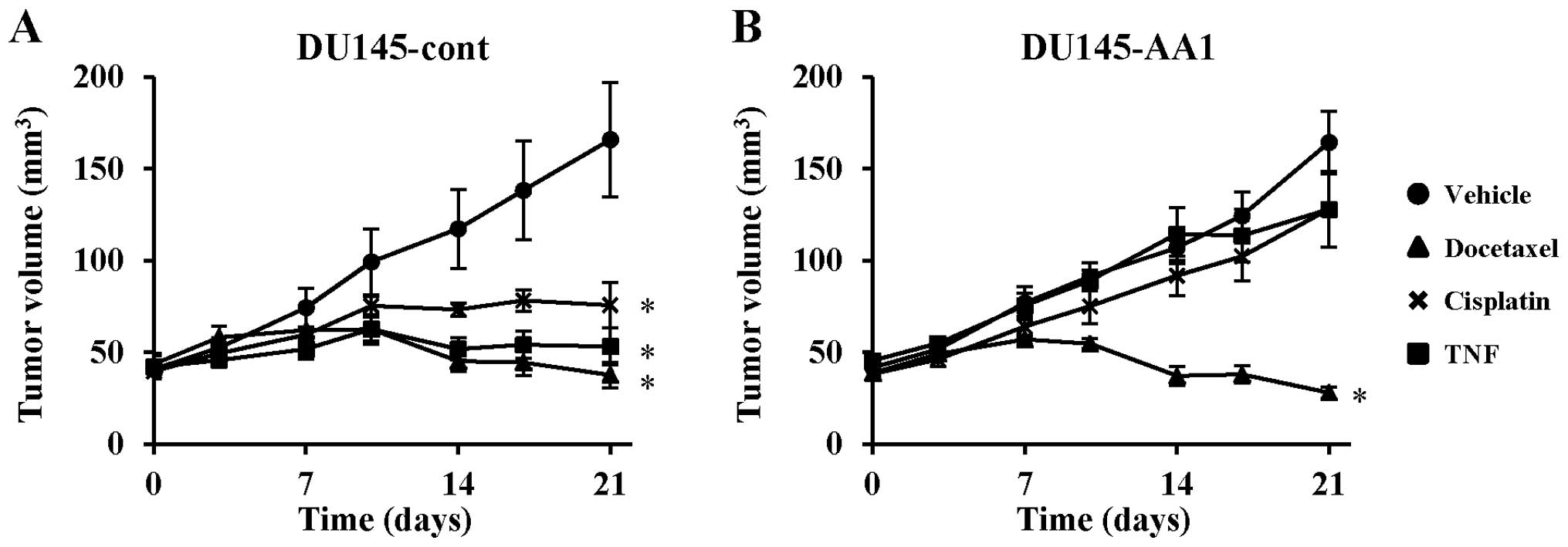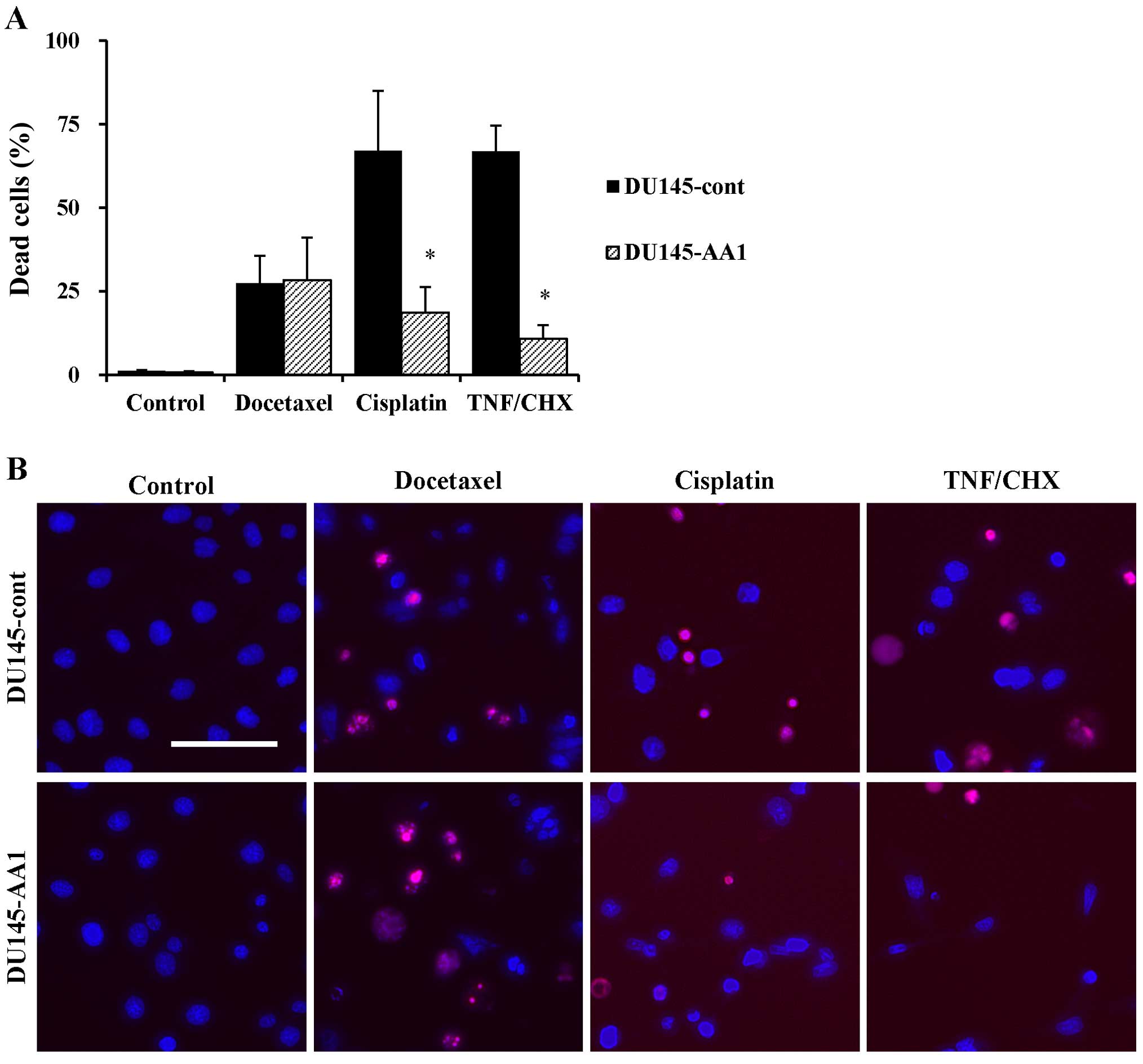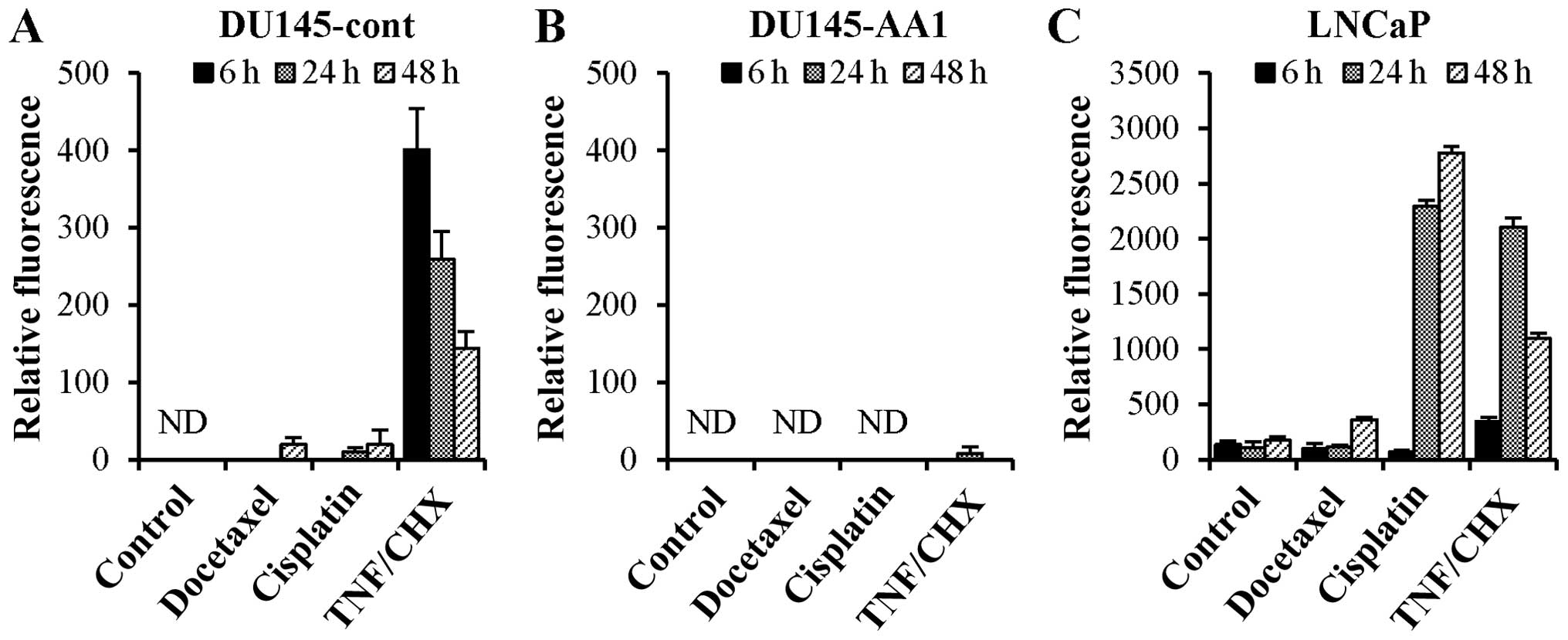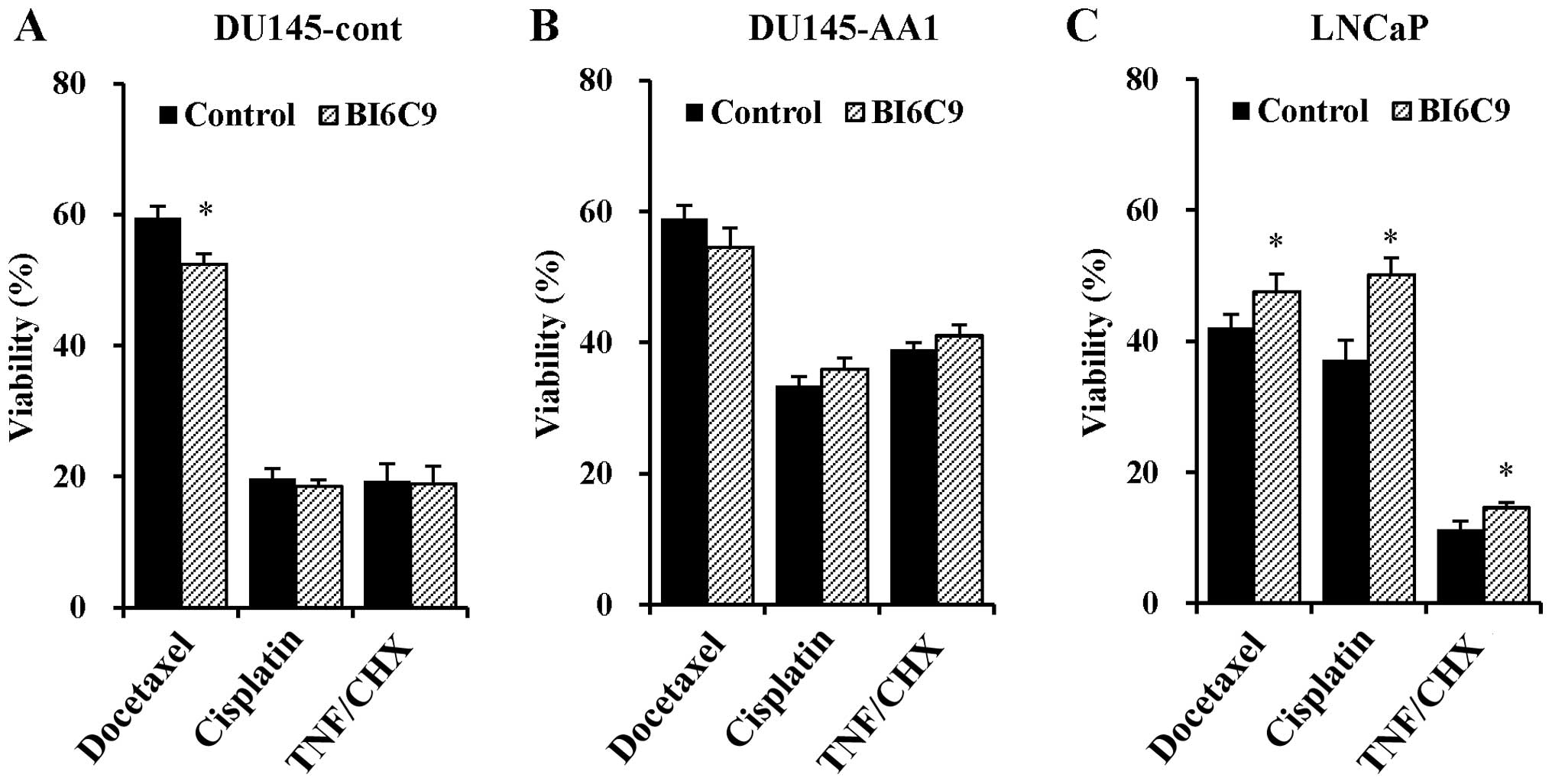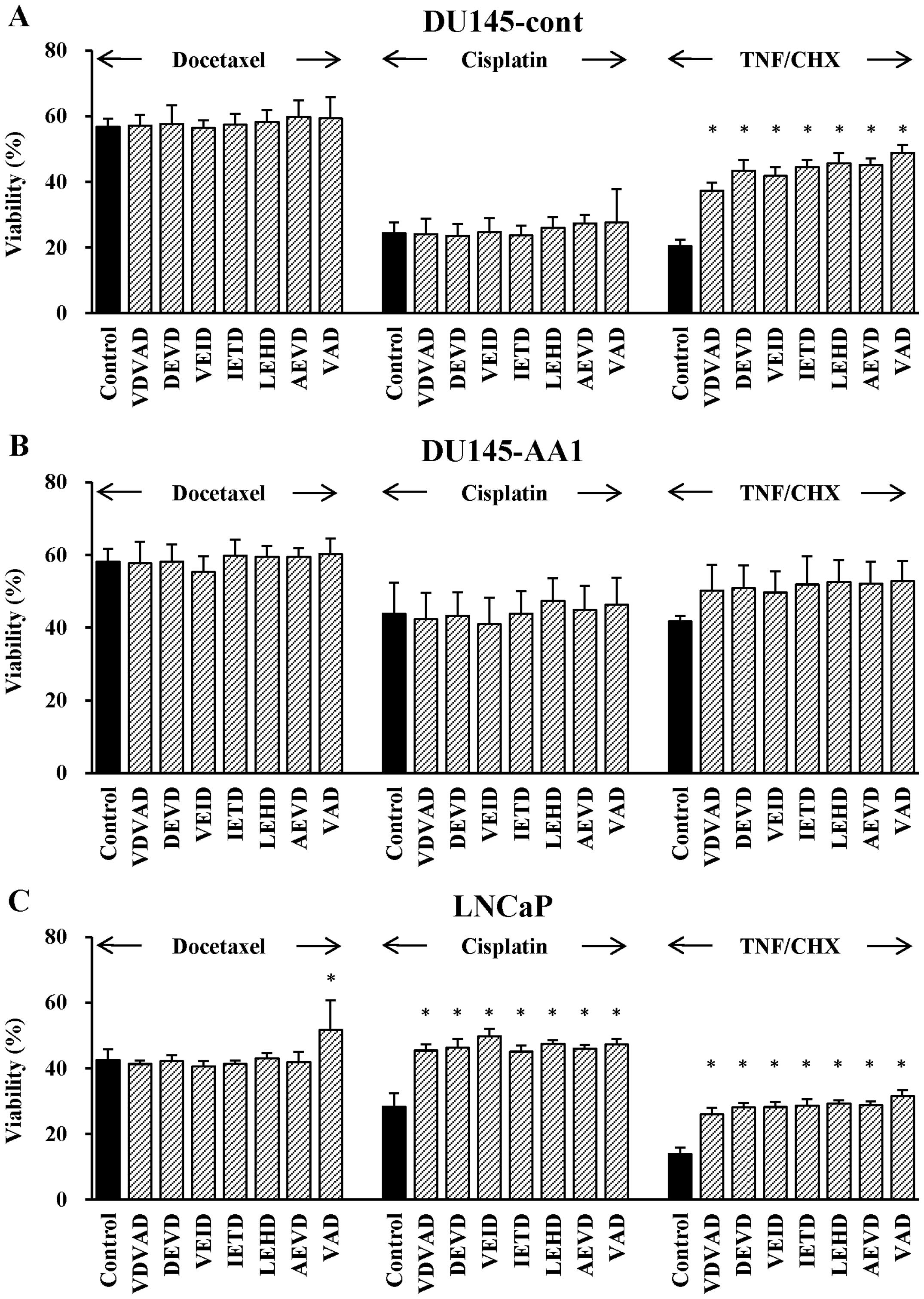|
1
|
Torre LA, Bray F, Siegel RL, Ferlay J,
Lortet-Tieulent J and Jemal A: Global cancer statistics, 2012. CA
Cancer J Clin. 65:87–108. 2015. View Article : Google Scholar : PubMed/NCBI
|
|
2
|
Siegel R, Ward E, Brawley O and Jemal A:
Cancer statistics, 2011: The impact of eliminating socioeconomic
and racial disparities on premature cancer deaths. CA Cancer J
Clin. 61:212–236. 2011. View Article : Google Scholar : PubMed/NCBI
|
|
3
|
Morgentaler A: Testosterone and prostate
cancer: An historical perspective on a modern myth. Eur Urol.
50:935–939. 2006. View Article : Google Scholar : PubMed/NCBI
|
|
4
|
Huggins C and Hodges CV: Studies on
prostatic cancer: I. The effect of castration, of estrogen and of
androgen injection on serum phosphatases in metastatic carcinoma of
the prostate. 1941. CA Cancer J Clin. 22:232–240. 1972. View Article : Google Scholar : PubMed/NCBI
|
|
5
|
Miyamoto H, Messing EM and Chang C:
Androgen deprivation therapy for prostate cancer: Current status
and future prospects. Prostate. 61:332–353. 2004. View Article : Google Scholar : PubMed/NCBI
|
|
6
|
Hammerer P and Madersbacher S: Landmarks
in hormonal therapy for prostate cancer. BJU Int. 110(Suppl 1):
23–29. 2012. View Article : Google Scholar : PubMed/NCBI
|
|
7
|
Tannock IF, de Wit R, Berry WR, Horti J,
Pluzanska A, Chi KN, Oudard S, Théodore C, James ND, Turesson I, et
al: Docetaxel plus prednisone or mitoxantrone plus prednisone for
advanced prostate cancer. N Engl J Med. 351:1502–1512. 2004.
View Article : Google Scholar : PubMed/NCBI
|
|
8
|
Petrylak DP, Tangen CM, Hussain MHA, Lara
PNJ Jr, Jones JA, Taplin ME, Burch PA, Berry D, Moinpour C, Kohli
M, et al: Docetaxel and estramustine compared with mitoxantrone and
prednisone for advanced refractory prostate cancer. N Engl J Med.
351:1513–1520. 2004. View Article : Google Scholar : PubMed/NCBI
|
|
9
|
Sinibaldi VJ: Docetaxel treatment in the
elderly patient with hormone refractory prostate cancer. Clin
Interv Aging. 2:555–560. 2007.
|
|
10
|
Merseburger AS, Bellmunt J, Jenkins C,
Parker C and Fitzpatrick JM; European Treatment Practices Group.
Perspectives on treatment of metastatic castration-resistant
prostate cancer. Oncologist. 18:558–567. 2013. View Article : Google Scholar : PubMed/NCBI
|
|
11
|
Sweeney CJ and Chamberlain D: Insights
into E3805: The CHAARTED trial. Future Oncol. 11:897–899. 2015.
View Article : Google Scholar : PubMed/NCBI
|
|
12
|
Fulda S and Debatin K-M: Extrinsic versus
intrinsic apoptosis pathways in anticancer chemotherapy. Oncogene.
25:4798–4811. 2006. View Article : Google Scholar : PubMed/NCBI
|
|
13
|
Pienta KJ: Preclinical mechanisms of
action of docetaxel and docetaxel combinations in prostate cancer.
Semin Oncol. 28(Suppl 15): 3–7. 2001. View Article : Google Scholar : PubMed/NCBI
|
|
14
|
Stein CA: Mechanisms of action of taxanes
in prostate cancer. Semin Oncol. 26(Suppl 17): 3–7. 1999.PubMed/NCBI
|
|
15
|
Ganansia-Leymarie V, Bischoff P, Bergerat
J-P and Holl V: Signal transduction pathways of taxanes-induced
apoptosis. Curr Med Chem Anticancer Agents. 3:291–306. 2003.
View Article : Google Scholar : PubMed/NCBI
|
|
16
|
Noguchi K, Shakuto S, Sakairi T and
Yoshida Y: Decrease in prostate specific antigen secretion
correlated with docetaxel-induced growth inhibition and apoptosis
in human prostate tumor cells. Gan To Kagaku Ryoho. 36:1863–1870.
2009.PubMed/NCBI
|
|
17
|
Green DR: Apoptotic pathways: Paper wraps
stone blunts scissors. Cell. 102:1–4. 2000. View Article : Google Scholar : PubMed/NCBI
|
|
18
|
Kuwana T, Smith JJ, Muzio M, Dixit V,
Newmeyer DD and Kornbluth S: Apoptosis induction by caspase-8 is
amplified through the mitochondrial release of cytochrome c. J Biol
Chem. 273:16589–16594. 1998. View Article : Google Scholar : PubMed/NCBI
|
|
19
|
Green DR: Apoptotic pathways: The roads to
ruin. Cell. 94:695–698. 1998. View Article : Google Scholar : PubMed/NCBI
|
|
20
|
Scaffidi C, Fulda S, Srinivasan A, Friesen
C, Li F, Tomaselli KJ, Debatin KM, Krammer PH and Peter ME: Two
CD95 (APO-1/ Fas) signaling pathways. EMBO J. 17:1675–1687. 1998.
View Article : Google Scholar : PubMed/NCBI
|
|
21
|
Luo X, Budihardjo I, Zou H, Slaughter C
and Wang X: Bid, a Bcl2 interacting protein, mediates cytochrome c
release from mitochondria in response to activation of cell surface
death receptors. Cell. 94:481–490. 1998. View Article : Google Scholar : PubMed/NCBI
|
|
22
|
Li H, Zhu H, Xu CJ and Yuan J: Cleavage of
BID by caspase 8 mediates the mitochondrial damage in the Fas
pathway of apoptosis. Cell. 94:491–501. 1998. View Article : Google Scholar : PubMed/NCBI
|
|
23
|
Gross A, McDonnell JM and Korsmeyer SJ:
BCL-2 family members and the mitochondria in apoptosis. Genes Dev.
13:1899–1911. 1999. View Article : Google Scholar : PubMed/NCBI
|
|
24
|
Yip KW and Reed JC: Bcl-2 family proteins
and cancer. Oncogene. 27:6398–6406. 2008. View Article : Google Scholar : PubMed/NCBI
|
|
25
|
Johnson MI, Robinson MC, Marsh C, Robson
CN, Neal DE and Hamdy FC: Expression of Bcl-2, Bax, and p53 in
high-grade prostatic intraepithelial neoplasia and localized
prostate cancer: Relationship with apoptosis and proliferation.
Prostate. 37:223–229. 1998. View Article : Google Scholar : PubMed/NCBI
|
|
26
|
Bubendorf L, Sauter G, Moch H, Jordan P,
Blöchlinger A, Gasser TC and Mihatsch MJ: Prognostic significance
of Bcl-2 in clinically localized prostate cancer. Am J Pathol.
148:1557–1565. 1996.PubMed/NCBI
|
|
27
|
Brown JM and Wilson G: Apoptosis genes and
resistance to cancer therapy: What does the experimental and
clinical data tell us? Cancer Biol Ther. 2:477–490. 2003.
View Article : Google Scholar : PubMed/NCBI
|
|
28
|
Srivastava RK, Sasaki CY, Hardwick JM and
Longo DL: Bcl-2-mediated drug resistance: Inhibition of apoptosis
by blocking nuclear factor of activated T lymphocytes
(NFAT)-induced Fas ligand transcription. J Exp Med. 190:253–265.
1999. View Article : Google Scholar : PubMed/NCBI
|
|
29
|
Inoue Y, Gika M, Abiko T, Oyama T, Saitoh
Y, Yamazaki H, Nakamura M, Abe Y, Kawamura M and Kobayashi K: Bcl-2
overexpression enhances in vitro sensitivity against docetaxel in
non-small cell lung cancer. Oncol Rep. 13:259–264. 2005.PubMed/NCBI
|
|
30
|
Losert D, Pratscher B, Soutschek J, Geick
A, Vornlocher H-P, Müller M and Wacheck V: Bcl-2 downregulation
sensitizes nonsmall cell lung cancer cells to cisplatin, but not to
docetaxel. Anticancer Drugs. 18:755–761. 2007. View Article : Google Scholar : PubMed/NCBI
|
|
31
|
Noguchi S: Predictive factors for response
to docetaxel in human breast cancers. Cancer Sci. 97:813–820. 2006.
View Article : Google Scholar : PubMed/NCBI
|
|
32
|
Liu C, Zhu Y, Lou W, Nadiminty N, Chen X,
Zhou Q, Shi XB, deVere White RW and Gao AC: Functional p53
determines docetaxel sensitivity in prostate cancer cells.
Prostate. 73:418–427. 2013. View Article : Google Scholar
|
|
33
|
Gurova KV, Rokhlin OW, Budanov AV,
Burdelya LG, Chumakov PM, Cohen MB and Gudkov AV: Cooperation of
two mutant p53 alleles contributes to Fas resistance of prostate
carcinoma cells. Cancer Res. 63:2905–2912. 2003.PubMed/NCBI
|
|
34
|
Tamaki H, Harashima N, Hiraki M, Arichi N,
Nishimura N, Shiina H, Naora K and Harada M: Bcl-2 family
inhibition sensitizes human prostate cancer cells to docetaxel and
promotes unexpected apoptosis under caspase-9 inhibition.
Oncotarget. 5:11399–11412. 2014. View Article : Google Scholar : PubMed/NCBI
|
|
35
|
Mediavilla-Varela M, Pacheco FJ, Almaguel
F, Perez J, Sahakian E, Daniels TR, Leoh LS, Padilla A, Wall NR,
Lilly MB, et al: Docetaxel-induced prostate cancer cell death
involves concomitant activation of caspase and lysosomal pathways
and is attenuated by LEDGF/p75. Mol Cancer. 8:682009. View Article : Google Scholar : PubMed/NCBI
|
|
36
|
Chwieralski CE, Welte T and Bühling F:
Cathepsin-regulated apoptosis. Apoptosis. 11:143–149. 2006.
View Article : Google Scholar : PubMed/NCBI
|
|
37
|
Delavallée L, Cabon L, Galán-Malo P,
Lorenzo HK and Susin SA: AIF-mediated caspase-independent
necroptosis: A new chance for targeted therapeutics. IUBMB Life.
63:221–232. 2011. View
Article : Google Scholar : PubMed/NCBI
|
|
38
|
Yang ZJ, Chee CE, Huang S and Sinicrope
FA: The role of autophagy in cancer: Therapeutic implications. Mol
Cancer Ther. 10:1533–1541. 2011. View Article : Google Scholar : PubMed/NCBI
|
|
39
|
Liao P-C, Tan S-K, Lieu C-H and Jung H-K:
Involvement of endoplasmic reticulum in paclitaxel-induced
apoptosis. J Cell Biochem. 104:1509–1523. 2008. View Article : Google Scholar : PubMed/NCBI
|
|
40
|
Jang M-S, Lee S-J, Kang NS and Kim E:
Cooperative phosphorylation of FADD by Aur-A and Plk1 in response
to taxol triggers both apoptotic and necrotic cell death. Cancer
Res. 71:7207–7215. 2011. View Article : Google Scholar : PubMed/NCBI
|
|
41
|
Kumar Biswas S, Huang J, Persaud S and
Basu A: Down-regulation of Bcl-2 is associated with cisplatin
resistance in human small cell lung cancer H69 cells. Mol Cancer
Ther. 3:327–334. 2004.PubMed/NCBI
|
|
42
|
Savry A, Carre M, Berges R, Rovini A,
Pobel I, Chacon C, Braguer D and Bourgarel-Rey V: Bcl-2-enhanced
efficacy of microtubule-targeting chemotherapy through Bim
overexpression: Implications for cancer treatment. Neoplasia.
15:49–60. 2013. View Article : Google Scholar : PubMed/NCBI
|















